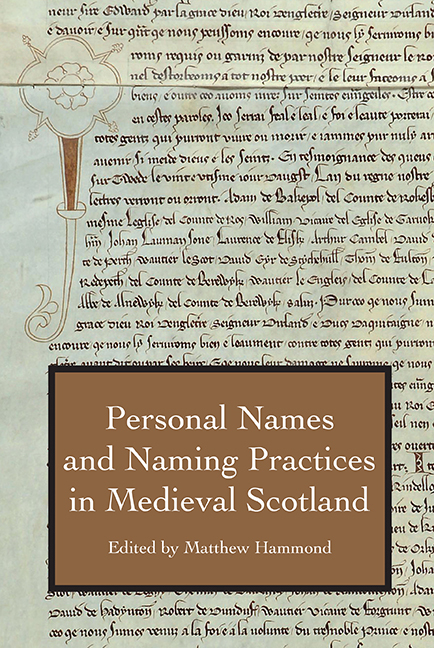Book contents
- Frontmatter
- Dedication
- Contents
- List of Tables
- Acknowledgements
- List of Contributors
- Abbreviations
- Note on the Text
- 1 Introduction: The Study of Personal Names in Medieval Scotland
- 2 Personal Names in Early Medieval Gaelic Chronicles
- 3 Gaelic Personal Names and Name Elements in Scottish Charters, 1093–1286
- 4 The Development of Mac Surnames in the Gaelic World
- 5 Forflissa/Forbflaith/Hvarflöð
- 6 Masculine Given Names of Germanic Origin in the Ragman Roll (1296)
- 7 The Romance of Names: Literary Personal Names in Twelfth- and Thirteenth-Century Scotland
- 8 Old Testament Personal Names in Scotland Before The Wars of Independence
- 9 Duthac Wigmore and Ninian Wallace: Scottish Saints and Personal Names in the later Middle Ages
- 10 Saints in Names in Late Medieval Argyll: a Preliminary Enquiry
- Bibliography
- Index
- Studies in Celtic History
7 - The Romance of Names: Literary Personal Names in Twelfth- and Thirteenth-Century Scotland
Published online by Cambridge University Press: 18 September 2019
- Frontmatter
- Dedication
- Contents
- List of Tables
- Acknowledgements
- List of Contributors
- Abbreviations
- Note on the Text
- 1 Introduction: The Study of Personal Names in Medieval Scotland
- 2 Personal Names in Early Medieval Gaelic Chronicles
- 3 Gaelic Personal Names and Name Elements in Scottish Charters, 1093–1286
- 4 The Development of Mac Surnames in the Gaelic World
- 5 Forflissa/Forbflaith/Hvarflöð
- 6 Masculine Given Names of Germanic Origin in the Ragman Roll (1296)
- 7 The Romance of Names: Literary Personal Names in Twelfth- and Thirteenth-Century Scotland
- 8 Old Testament Personal Names in Scotland Before The Wars of Independence
- 9 Duthac Wigmore and Ninian Wallace: Scottish Saints and Personal Names in the later Middle Ages
- 10 Saints in Names in Late Medieval Argyll: a Preliminary Enquiry
- Bibliography
- Index
- Studies in Celtic History
Summary
It has been well established that the name-stock of Scotland changed during the twelfth and thirteenth centuries, in common with many other European countries. This change was characterized by a narrowing of the pool of personal names, and an expansion of the use of a smaller number of names (male names such as William, Richard, Stephen, and Jocelin; female names such as Matilda/Maud, Margaret, and Ada), mostly of Germanic or Latinate derivation, in common with other parts of Europe. The locus classicus for our appreciation of this phenomenon is Robert Bartlett's The Making of Europe, where he included this change amongst others in a package of what he termed ‘Europeanisation’. He illustrated his point with reference to the royal family of the Scots, where the eleventh-century kings such as Mac Bethad, Máel Coluim, and Domnall were succeeded by individuals with names such as William and Henry; in place of queens such as Bethóc and Gruoch, we find Margarets and Matildas.
Prominently, of course, King Máel Coluim mac Donnchada (Malcolm III, 1058–93) had younger sons named Alexander and David, new names amongst the Scottish royalty, and innovative names more widely in the eleventh century. While David was probably a biblical name, Alexander is more problematic. Its potential origin has been explored by Stephen Marritt, but certainly one aspect of it is likely to be its literary resonance, drawing, as it does, on the cycle of tales circulating in various languages in Europe at this stage relating to Alexander the Great. In this chapter, we argue that literature-inspired naming was a more widespread phenomenon amongst the nobility of twelfth- and thirteenth-century Scotland. Importantly, the fashion of innovating in naming practice by using names derived from literature was a cross-cultural phenomenon, with both the speech communities of the namers, and the linguistic and cultural origins of the literature from which these literary names were derived, being quite diverse. We will survey the data regarding this, and then drill down to examine a number of case studies which reveal the variety and diversity of this practice.
The data collected for the projects which go to make up The People of Medieval Scotland, 1093–1314 (poms.ac.uk) allow us to apply some numbers to this phenomenon.
- Type
- Chapter
- Information
- Publisher: Boydell & BrewerPrint publication year: 2019



